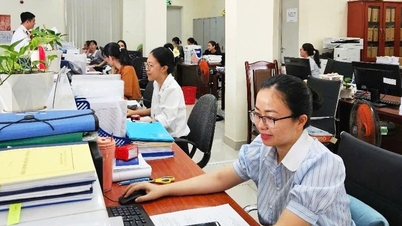The State Treasury ( Ministry of Finance ) said that the reason why some units and localities are slow in paying salaries and essential expenses is because the units do not have accounts, do not have seals, and have not identified accountants... in the process of implementing the 2-level local government model.
To ensure smooth payment of salaries and other salary-related expenses, professional fees, and public service fees during the transition period, the State Treasury has provided detailed instructions on account opening procedures and payment control in accordance with Decree 11/2020 of the Government and Circular No. 17/2024 of the Ministry of Finance.
The State Treasury also noted that budget expenditures must ensure that they do not exceed the staffing target, are consistent with the assigned budget estimate, and that the budget estimate must be temporarily allocated in cases where the People's Council or People's Committee has not yet decided to allocate the budget estimate.

Besides, the issue of deposit accounts still existing at the State Treasury at district level after implementing the two-level local government is one of the major concerns.
The State Treasury responded that, based on Resolution No. 190/2025 of the National Assembly and Official Dispatch No. 4205 of the Ministry of Finance, the agency or organization receiving the task will receive these accounts in their original state to continue managing and handling them according to regulations.
At the same time, instruct the unit to contact the State Treasury where the transaction is made to carry out procedures to change legal documents or transfer data to the appropriate place. This ensures continuity and no interruption in financial management.
In particular, recently, many localities have been confused about the process of entering budget estimates into the TABMIS system at the commune level.
Regarding this issue, the State Treasury said that according to Clause 2, Article 1 of Circular No. 41/2025 of the Ministry of Finance (effective from July 1): "For commune-level budgets, the State Treasury where the transaction is made shall enter, approve the budget entries on TABMIS and enter the payment orders of the commune-level budget".
This means that the State Treasury will provide full technical support to the commune level throughout the entire process, helping localities feel secure in implementing budget expenditure tasks.
The State Treasury has also issued guidelines on signature registration for financial agencies for transactions. Accordingly, it clearly defines the first signature (chairman, vice-chairman of the commune People's Committee or head of the economic department) and the second signature (head of the economic department or officer assigned to manage the account).
The State Treasury emphasizes that the assignment of officers to sign documents must be based on the actual local situation, avoiding mechanical and rigidity, to ensure flexibility in implementation.

Source: https://vietnamnet.vn/ly-do-dia-phuong-cham-tra-luong-khi-thuc-hien-chinh-quyen-2-cap-2426858.html


![[Photo] General Secretary attends the parade to celebrate the 80th anniversary of the founding of the Korean Workers' Party](https://vphoto.vietnam.vn/thumb/1200x675/vietnam/resource/IMAGE/2025/10/11/1760150039564_vna-potal-tong-bi-thu-du-le-duyet-binh-ky-niem-80-nam-thanh-lap-dang-lao-dong-trieu-tien-8331994-jpg.webp)
![[Photo] Ho Chi Minh City is brilliant with flags and flowers on the eve of the 1st Party Congress, term 2025-2030](https://vphoto.vietnam.vn/thumb/1200x675/vietnam/resource/IMAGE/2025/10/10/1760102923219_ndo_br_thiet-ke-chua-co-ten-43-png.webp)

![[Photo] Opening of the World Cultural Festival in Hanoi](https://vphoto.vietnam.vn/thumb/1200x675/vietnam/resource/IMAGE/2025/10/10/1760113426728_ndo_br_lehoi-khaimac-jpg.webp)
































































































Comment (0)